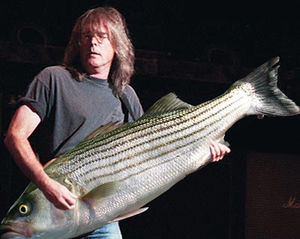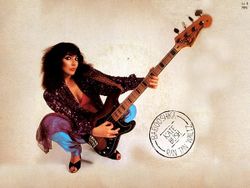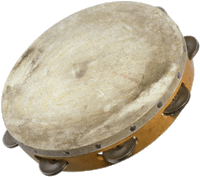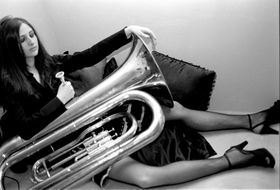Bass

Bass is a low frequency sound in music that is used to counterpoint the main melody, usually adding depth and subtlety to the composition. There is a bass "version" of almost every instrument, which can usually be identified by the massiveness of the instrument and the reluctance of musicians to play them. It makes a very deep, reverberating sound like DUMMMMMMMMMMMMMMMMMM, which of course is a highly important part of any composition.
There is an opinion amongst the general populace that bass is a largely inconsequential aspect of music. These people, who obviously know nothing about the aural arts, cite the fact that you can barely even hear bass through most speakers as evidence that it is of no great concern. Of course, they should just stop listening to music on their mobile phones and buy a proper sound system. All respected music scholars know that bass is vital to a concerto - equal to any lead instrument such as guitar, trumpet or mouth organ. In fact, it's probably even more vital than those.
From Tyrannosaurus Rex (dinosaur) to Tyrannosaurus Rex (band) - The History of Bass
Like all underdogs, bass has had a long and interesting history.
Prehistoric Bass
It is not thought that music existed on Earth until early Man developed, aside from the natural rhythms and melodies made by the workings of the cosmos, of course. And although the Earth-shaking growls of some of the dinosaurs were quite bassy, such sounds could not really be considered music in any traditional sense. Even Yoko Ono would turn her avant-garde nose up at that. Then humans came along and started warbling, tapping hollow logs and drumming on their spouse's heads, and with this, intentional music was born. However, prehistoric man was not quite intelligent enough to grasp the complex subtleties of the bass, so it was not something they paid much mind. In fact, their music didn't really get past the "hitting things with sticks" stage for several thousand years, when the first ancient civilisations started to develop. Although historians believe some of the fatter people they beat may have made sounds that could be approximated to bass.
Ancient Bass
The first proper use of bass was probably by the Assyrians, who enjoyed the first proper use of pretty much everything. The earliest known bass instrument was actually a form of lyre excavated from the ancient city of Ur, dating back to about 3,000 BCE. This "bass-lyre" would have been used to provide a back-up section to the smaller, dainter lyres and harps that provided the lead. Because its strings were made of solid gold the bass-lyre was a luxury that only the most privileged members of Assyrian society could afford. Assyria therefore had the quietest buskers in history.
More primitive tribes did invent their own bass instruments from time to time however, including the manskin bongos of Bamana people to the Wallaboodigerowodgeru of the Aboriginal Australians.
Classical Bass
The delicate yet robust sounds of bass were not lost on the classical geniuses such as Mozart and Falco of course. You may be aware of a little ditty called Beethoven's 5th? You're probably familiar with its famous intro at least, compromising of a simple but distinctive four note motif, like so:
Beethoven's 5th is possibly the most well known and acclaimed song in the history of music, and it's all thanks to this stirring bass melody. At one point it was even the best selling single of all time, but sadly it was recently knocked from the top spot by the Black Eyed Peas' hit My Humps. Another notable bass classic is Johan Sebastian Bach's Concerto for Bassoon, which is widely regarded as one of the best pieces of music ever written for the bassoon.
Modern Bass
It wasn't until the modern age that bass really started to shake things up - literally - with its enormous heart-vibrating sounds. A lot of this was thanks to the Blues - big black guys like Big Bill Broonzy, and big black women like Big Bessie Smith, whose very voices were a kind of bass. Blues also saw the invention of the "bassline", where for the first time the bass did more than just play a root note every couple of minutes. It actually started doing solos, something previously reserved for smug guitarists, histrionic singers, schmaltzy pianists, vaccuous drummers, frigid vilionists, over-enthusiastic trumpeteers and paedophilic flautists - everyone, in fact, except the poor, neglected bassist. Hell, even the spoonist used to get more bad-ass riffs than we did.
Another thing that brought it into the forefront was the common phrase "turn up the bass!" which was popularised by club DJs across the Western world, although in most cases where the phrase was used the bass was already deafeningly loud.
Types of Bass
There are many different basses out there. In fact, virtually every instrument has a large, deep, fatherlike version of itself, which can be used to back-up the corresponding lead instrument with sweet, pulsating bassnotes. You'd be forgiven for thinking that basses are just giant, almost unwieldy versions of the main instruments, because in all honesty a lot of them are. Still, this kind of thinking debases the bass somewhat, and implies that it is not a true musical instrument in its own right. This tends to be the opinion of those who play the more treble-y instruments like the keyboards, the trombone and the rain-stick. Turn your treble down, idiots!
Being Overlooked
Most casual listeners believe that bassists may as well not be there. Even bass singers such as Tom Waits and Nick Cave are dismissed as tuneless drunkards - although that is true for the most part. This opinion has only been cemented recently due to a recent news story: The bass-xylophonist in the Sydney Symphony Orchestra didn't turn up for their auspicious Madison Square Garden gig in front of the Queen of Spain because he was busy shagging groupies and injecting cocaine powder into his arse - and no one even noticed he was gone. Her Majesty herself even said they sounded flawless, leading many to declare bass pointless and cumbersome. However, no doubt there were a few audiophiles like myself in the stalls, squirming and desperately trying to plug our ears to shut out the hideous, un-dynamic din.
A couple of rock bands have even done away with the section all together, such as The White Stripes, who consist of just a guitarist and a drummer. Their success and acclaim would seem to prove the theory that bass is not important, but in actual fact the general shittiness of their songs simultaneously discredits it.
Eroticism
The bass has a long history of being sexually appealing to both sexes. From 17th Century Italian cellist Salvatore Rugeri to that chick from that indie band, there has always been something attractive about people who reside in the octaves below middle C. Think of Barry White for instance, who was monstrous to behold and yet caused millions of orgasms across both Hemispheres. This, of course, was because of his beautiful bassy voice, and the fact that it vibrated at the exact frequency required to stimulate the female clitoris.
A common stereotype in the bass playing world is that of the "girl bassist". Generally speaking, they are an untalented but hot individual who plays bass in a group primarily composed of men, and brings nothing to the formula other than image. As such in these superficial times they tend to become the most famous member of the band and are usually the only reason anyone comes to their gigs in the first place.
Of course, most women who play instruments are kind of hot, but somehow a bass instrument just ups the sexiness ante. Many have speculated why this may be, and most have agreed that it is something to do with the size of the instrument. Imagine a dainty young damsel struggling to support an enormous upright-cello with her thin, pale arms - or a well-bred oboist pursing her lips and blowing sensuously into a giant baritone phallus. If she can handle something that big imagine what she could do with my tiny penis...
See also




